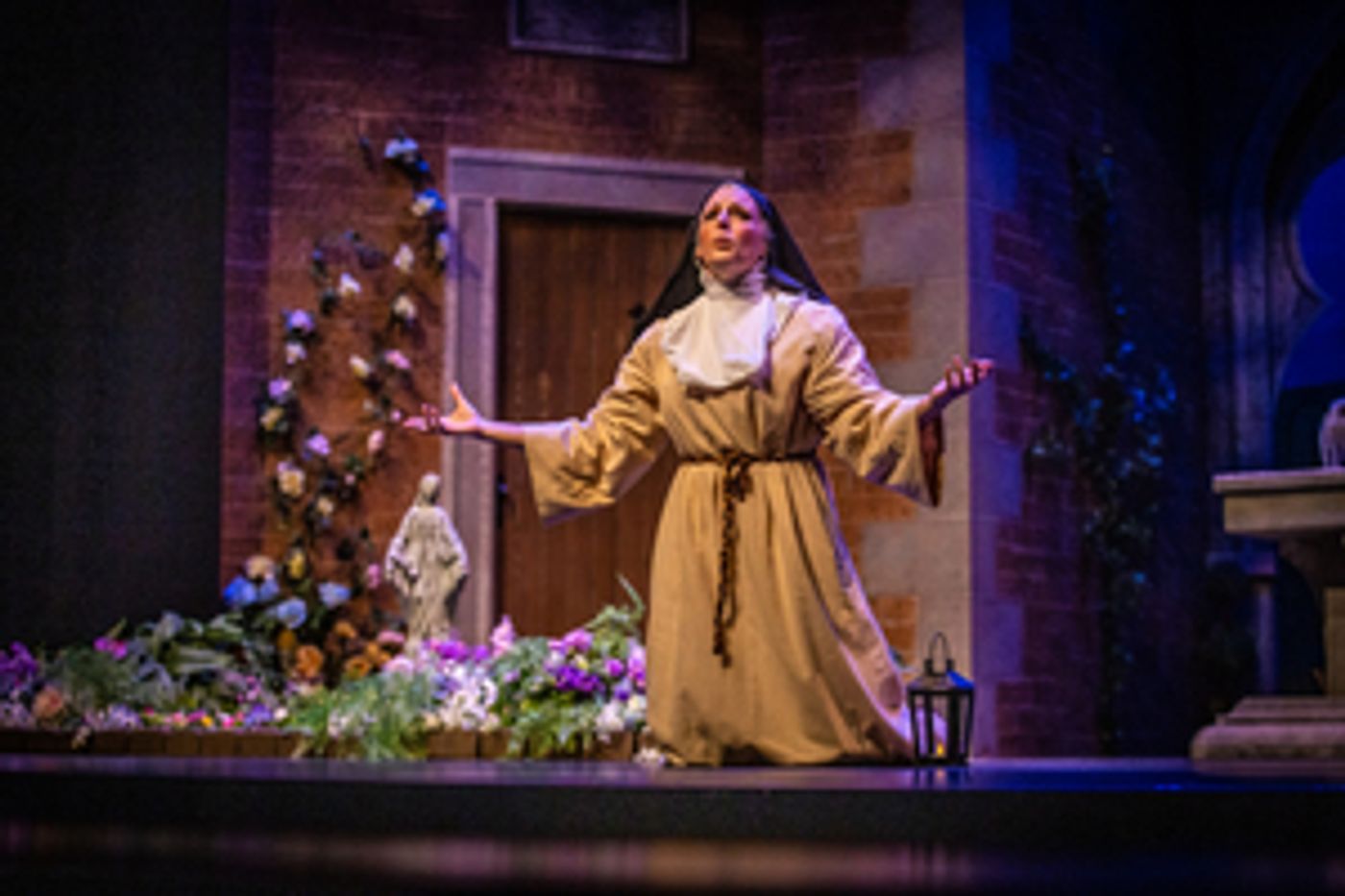Review: SUOR ANGELICA Opens at Winter Opera Saint Louis
A rare Puccini delight at Winter Opera Saint Louis.

Winter Opera Saint Louis rises from its pandemic slumber with a very lovely production of one of Puccini's more rarely performed works-Suor Angelica. This sentimental tale of a grief-stricken nun is part of Puccini's Trittico, or triptych of one-act operas. The other works in the triptych are Il tabarro and Gianni Schicchi. His goal with these three works was to express opera's contrasting modes: the tragic, the lyrical, and the comedic. Suor Angelica beautifully fulfills his "lyrical" requirement. It premiered at the Met in 1918.
Angelica is written without an overture, but Orchestral Conductor Edward Benyas and Stage Director Gina Galati decided to bless us with an extra gift-two familiar preludes.
- Puccini's prelude to Traviata whispers to us with strings-gentle, oh so gentle-then wakes to a slow, confident, romantic stroll. It's beautifully and sensitively performed, and most appropriate to this sentimental tale.
- Debussy's Prelude to The Afternoon of a Faun needs no description, but I can't remember hearing it played more perfectly. Jennifer Mazzoni, on flute, gives the instrument such richness and purity. And such phrasing! Quite wonderful. Truly excellent, flawless work is also done by Rachel Miller on harp and Christina Schempf on horn. At times I fancied I could almost catch a glimpse, through dew-sparkling leaves, of that faun gamboling in some Hellenic glade.
Then we meet Sister Angelica.
The story takes place in the seventeenth century. We are in the courtyard of a convent near Florence-lovely stone buildings with vines and roses on the walls, broad stone steps, a flower garden, and a small fountain near the center. Above and behind is a beautiful blue sky with gorgeous white clouds. All this is the work of the gifted designer Scott Loebl.
The sisters are assembling, as usual each morning, to receive their scoldings for little infractions. Some charmingly beg the Zelatrice (their monitor) for even heavier punishments. They confess their modest wishes (though to wish for anything is officially taboo). Sr. Angelica admits to no wishes at all, but everyone knows she secretly yearns for contact with her noble family (no word in seven years). Even more she yearns for news of her illegitimate son who was taken from her at birth. For so shaming her family she was forced to take the veil and spend her life in penance.
Sr. Angelica is the herbal healer of the convent. From among all her flowers and herbs she can always concoct a medicine for anything-even wasp stings.
A grand coach appears and brings Angelica's aunt, a great princess. Cold as stone, she demands that Angelica sign away any right to a portion of their estate. When Angelica begs for news of her son the Princess callously tells her that he's dead, then departs.
Poor Angelica! Grief-stricken she sings the most beautiful aria in the opera: "Senza mamma, o bimbo, tu sei morto!" ("Without your mother, o my baby, you die!") (Or, as Google-Translate would have it, "Without your mother, baby, you're dead!")
She has no reason to live, so, eager to join her child in Heaven, she brews a poison from her flowers and drinks it. Thank heaven the poison is slow-acting (as is the convention in all opera deaths-by-poison), so we are allowed to see Angelica's "Oops!" moment: "Oops! I just remembered! Suicide is a mortal sin, so I won't be going to Heaven after all!"
But her love and grief are so great that an appeal to the Virgin Mary is granted. The doors of Heaven open to reveal a little boy holding the Virgin's hand. As the music swells and the lights fade the Virgin sends the boy down to his dying mother. The final moment is visually lovely (if perhaps cliché): Angelica, reaching up the steps, her son reaching down, almost-but-not-quite touching. It's an evocation of Michelangelo's God-creating-Adam, and has that same poignant sense of "almost-ness".
the Virgin's hand. As the music swells and the lights fade the Virgin sends the boy down to his dying mother. The final moment is visually lovely (if perhaps cliché): Angelica, reaching up the steps, her son reaching down, almost-but-not-quite touching. It's an evocation of Michelangelo's God-creating-Adam, and has that same poignant sense of "almost-ness".
So, the happy ending is effected by a sort of Virgina-ex-machina, but it nevertheless satisfies.
Winter Opera has made slight, deft economies by reducing the cast from 15 to 13. (Four roles are merged invisibly into two.) Moreover, most of the cast serve also as choristers. Puccini would be quite content.
The principals are splendid. Angelica is sung with beautiful power and discipline by Karen Kanakis (who triumphed last season as Minnie, the central role in Fanciulla del West at Winter Opera). Now, as Sr. Angelica, her singing of "Senza mamma, o bimbo" drew applause considerably more extended than might be expected from the sparse audience at the dress-rehearsal preview which I attended. Ms. Kanakis is blessed with carriage and grace, and with a beauty that would be at home on the classic Greek stage.
Nora Treipen does wonders as the dark-hearted Principessa. Cold and haughty and with a grandly dramatic face she is simply commanding! This is an iron lady, not to be brooked! And she has a marvelously strong and expressive voice.
The Badessa (Abbess) and the Zelatrice are sung beautifully by Erin Haupt who is popular on both Winter Opera and Union Avenue Opera stages.
Chorus passages are lovingly handled. The "Ave Maria" at the top of the show sets the perfect conventical tone.
Costumes, by Lauren Smith Bearden are well-suited to the time and setting. Her choice of a light beige for the nuns' habits keeps gloom away from this story, which, after all, is lyrical, not tragical.
The very effective lighting is designed by Patrick Neal Bearden.
Maestro Bunyas obtains lovely balance in his orchestra, and finds every emotional nuance to support this story of pathos and sentiment.
This is Puccini's only all-female opera, but we don't miss the men at all. I'm reminded of that other nunnery opera that appeared at Opera Theatre Saint Louis six years ago: Poulenc's Dialogues of the Carmelites. In both cases the nuns attain Heaven. But these two works are so different. Poulenc's nuns, filled with faith, march calmly to the guillotine and martyrdom. Tragedy! Puccini's nun attains heaven, despite a mortal sin, through the sheer grace of the Virgin Mary. Redemption through love and grief.
The performance is done at the spanking new Kirkwood Center for the Performing Arts. It's a gorgeous, comfortable venue. Performances continue through March 21.
Photos by Riq Dilly with Convergence Media.
Reader Reviews
Videos

